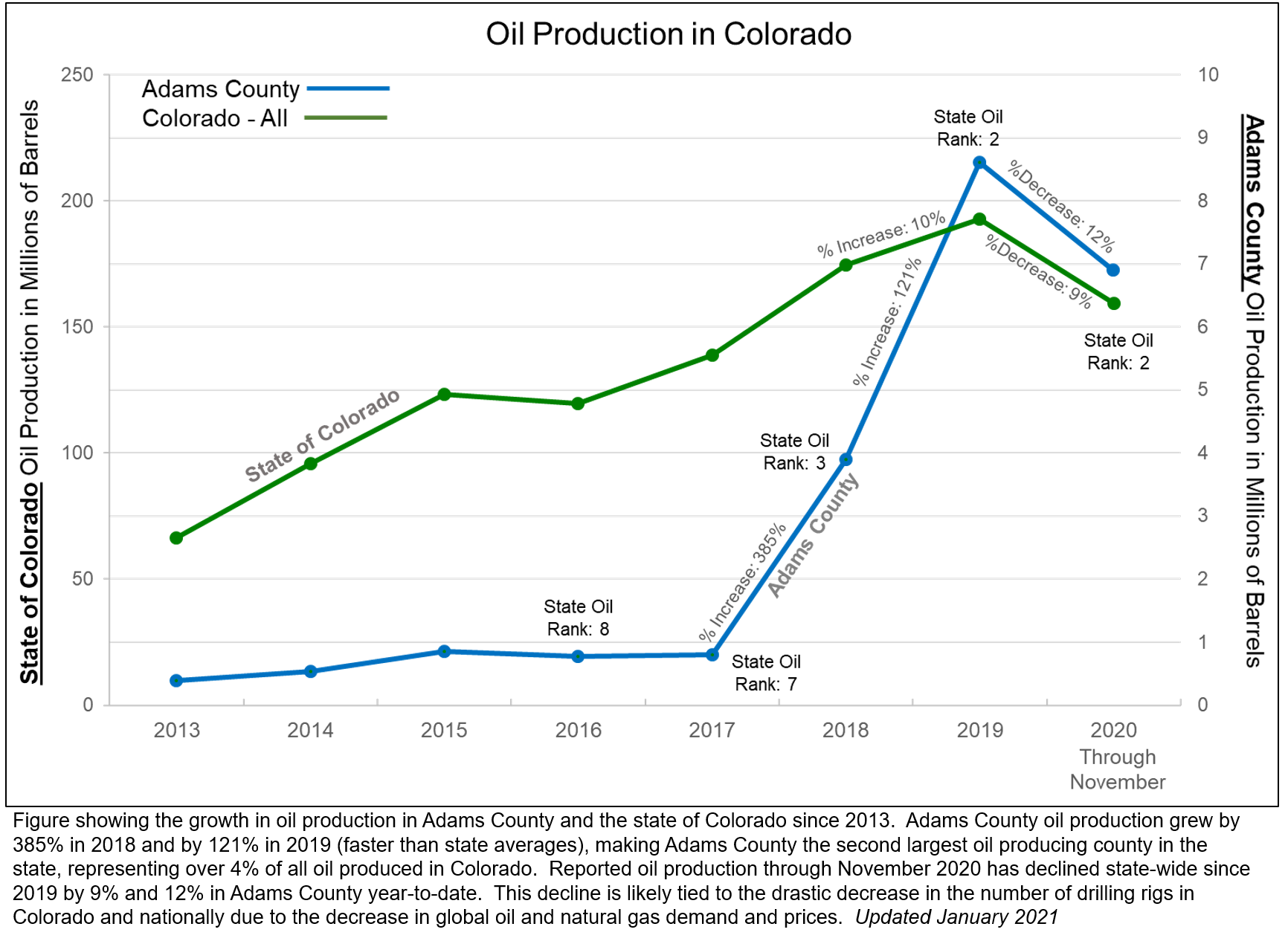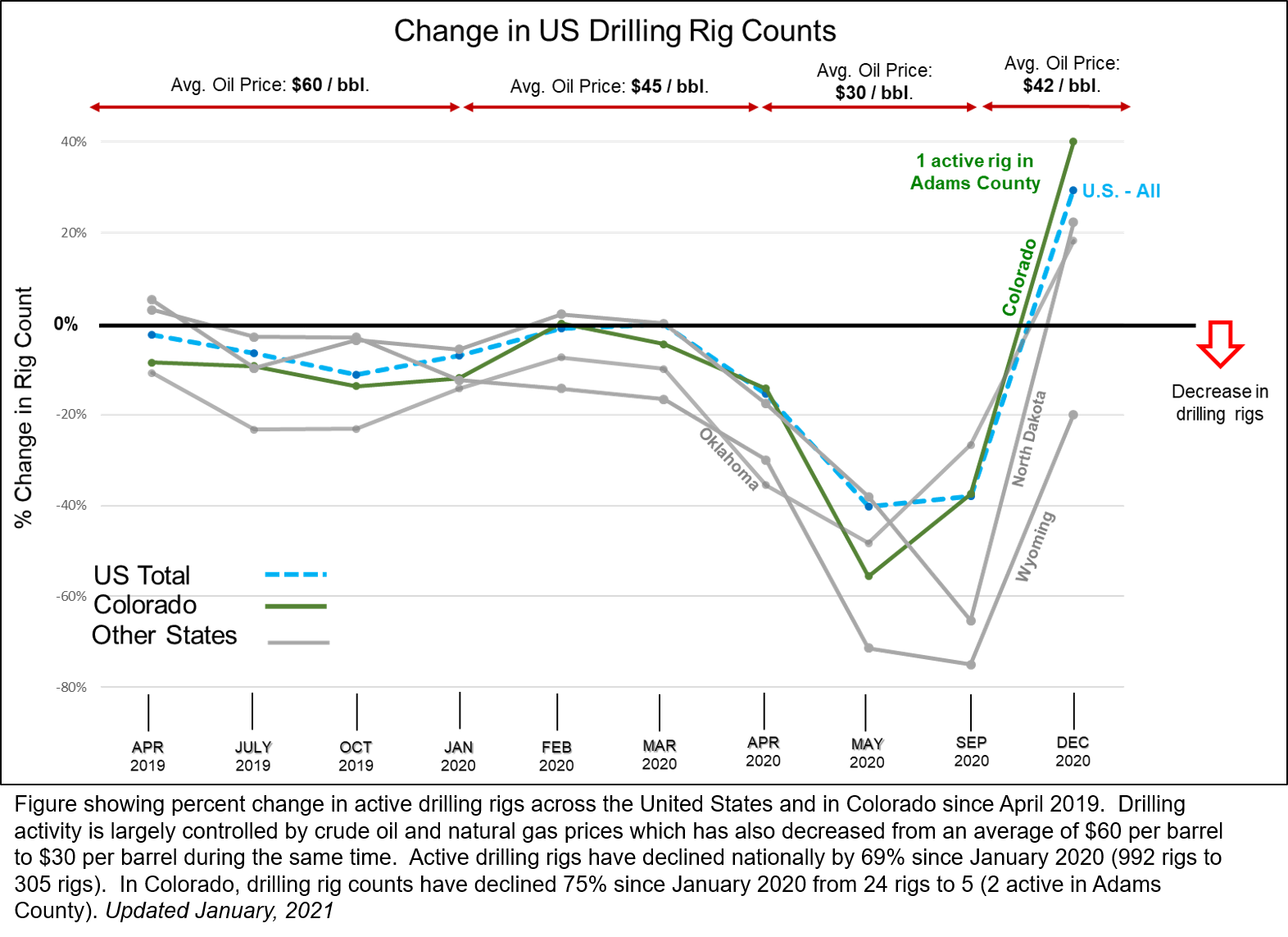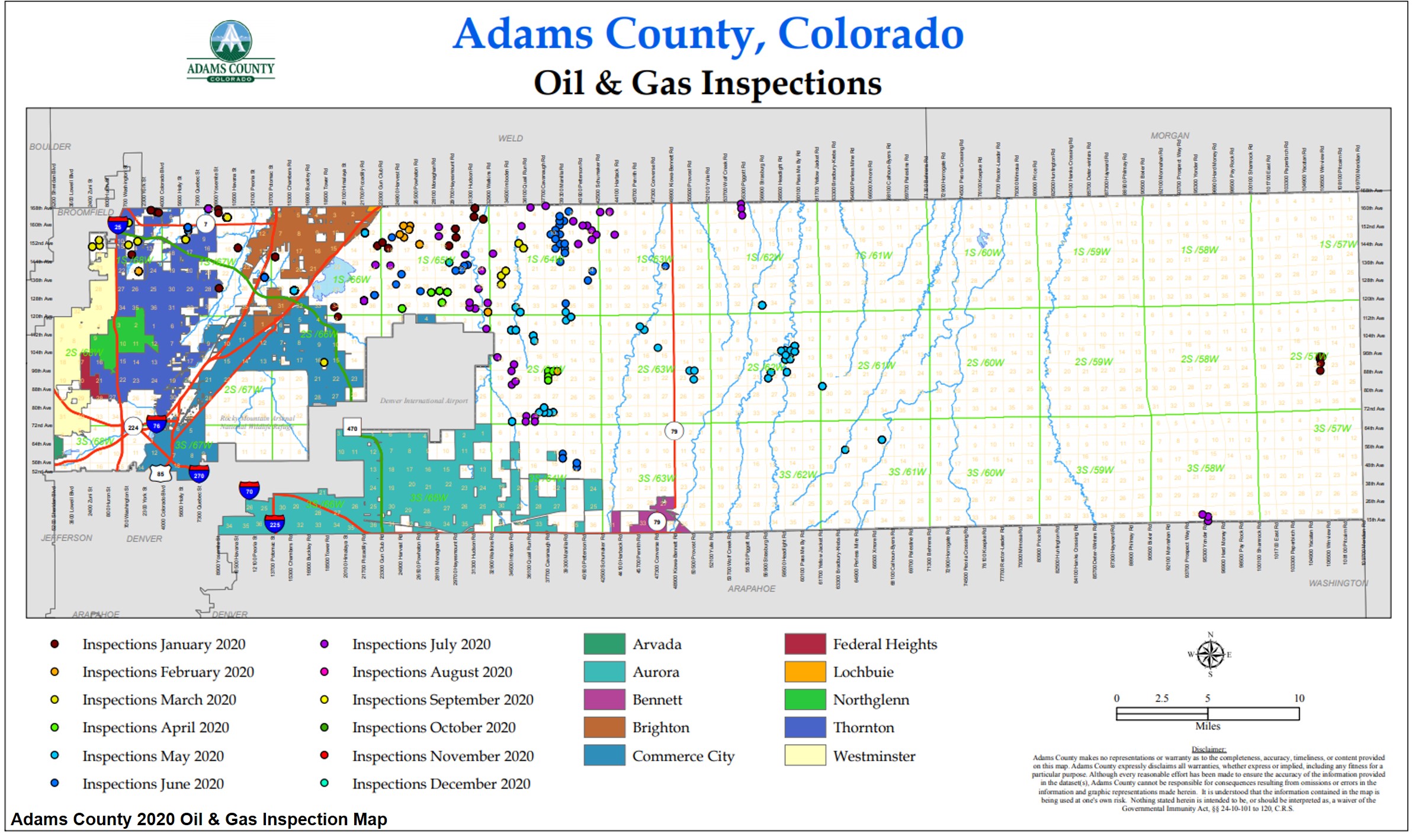Oil & Gas Information
- Monthly Oil and Gas Update - March 2025
- Orphaned Well Progress Report - Dec. 7, 2022
- Letter on KPK Enforcement Matter at the COGCC - Jan. 2023
As requested during the Aug. 23, 2022, Study Session, staff has prepared the memos linked below reviewing orphaned wells in Adams County and their associated impacts.
Oil & Gas Facility Regulations
On July 27, 2021, the Board of County Commissioners approved new oil and gas regulations. The County's revised Oil and Gas Regulation are located in the Development Standards and Regulations manual:
- Oil and Gas Regulations Informational Pamphlet: English | Spanish
- Oil and Gas Regulations
- Chapter 2: Discusses the OGF Permitting Process
- Chapter 3: Discusses the OGF Zoning Designations
- Chapter 4: Discusses the OGF Performance Standards
- Chapter 11: Applicable Definitions
- Appendix A: Development Application Guide
- OGF Conceptual Review Process & Application
- OGF Permit Application
Comments, questions, and feedback regarding these regulations can be submitted to Greg Dean, Oil & Gas Liaison, via email at gdean@adcogov.org or phone at 720.523.6891.
Planned Workover Rig Activity
Workover rigs are mobile rigs used mainly to perform remedial operations such as routine maintenance and plugging and abandonment. This type of equipment is not the same as larger rigs often used to drill new horizontal wellbores. These operations are generally allowed under COGCC and County rules and typically occurs during daylight hours only and for short time durations. An updated list of workover rig activity can be found in the report here. Should you have any questions, please reach out to the County Oil & Gas Liaison via the contact information below. Last updated: 02/24/2022.
Oil & Gas Information
- Weekly Oil and Gas Activity Report Last Updated: 6/30/2022
- View Current Oil and Gas Cases
- CDPHE 2019 Study: Human Health Risk Assessment for Oil and Gas Operations - full study report
Cryptocurrency / Digital Currency Mining on Oil & Gas sites
The Director of Community and Economic Development issued an Interpretation of Use pursuant to her authority under sections 1-03-01 and 3-05-02 of the County's Development Standards and Regulations that prohibits cryptocurrency / digital currency / electronic currency mining operations on oil and gas facilities. This use is not defined in the County regulations nor determined to be substantially similar to another identified permitted or conditional use. Understanding this use is a developing technology and growing in popularity in Colorado and across the U.S. Staff will endeavor to develop regulations that may allow this in certain zone districts with proper permitting and performance standards to mitigate any potential off-site impacts. Updated: June 6, 2022.
Broomfield - Extraction/Civitas oil and gas facilities
Extraction Oil & Gas / Civitas operates several oil and gas facilities within the City and County of Broomfield (CCOB), near the border with unincorporated Adams County. These facilities are under the jurisdiction of the CCOB and COGCC and specific questions or comments should be directed to those agencies. Some important notes about the robust safety plan in place for these facilities in the unlikely event of an emergency:
- Evacuation plans and safety protocols are in place and posted on the CCOB Oil and Gas page (and attached here) that were created in conjunction with Broomfield Police, North Metro Fire District (NMFD), Broomfield Office of Emergency Management (OEM), and AdCo OEM. Some of these measures include:
- Predetermined evacuation points and notification protocols
- Special considerations for at risk populations, such as those living in nearby assisted living facilities, and those in hospitals, etc.
- Evacuation and traffic plans for each pad including the placement of police barricades, tentative evacuation routes, and traffic flow patterns.
- NMFD is responsible for executing these measures and they may order situation-specific measures depending on a myriad of variables, such as alternative routes or shelter-in-place orders.
- The Tactical Response Plan (TRP) and emergency plans are updated annually by the Operator and the CCOB
- AdCo OEM is included in TRP for these facilities. As the primary emergency response group within the County, AdCo OEM was involved during all pre-operational table top exercises for these sites
- NMFD are the hazardous emergency responders and serves the residents of unincorporated AdCo that are near these facilities
- CodeRed is the primary notification platform for all emergencies (not just oil and gas) and it is the resident’s responsibility to enroll in those notifications
- As the TRP is an emergency response protocol, the most important first-order notifications should be to appropriate emergency response experts and not the Adams County LGD.
- AdCo LGD is notified within 24-48 hours per COGCC rules should any event result in an incident report or violation
Adams County public comments
Adams County regularly submits public comments on oil and gas related applications and rulemakings at the State-level and within other municipalities aimed at addressing and mitigating potential land use impacts to public health and safety, welfare, the environment and wildlife resources. The county has commented on the following proposals since October 2019:
- City of Aurora: MCC 3-66 25-27 Pad
- City of Brighton: Prairie LE Pad, Pioneer Produced Water Pipeline
- City of Commerce City: Condor Pad, Blue Jay Pad, Owl Pad, Falcon Pad
- COGCC: Flowline Rulemaking, Ivey LC Pad, Gus LD Pad, Freedom 33 Pad (Weld County), Prairie LE Pad, Wellbore Integrity Rulemaking, MCC 3-66 Pad, Mission Change Rulemaking, Conner Pad, Ivey LC Pad Air Monitoring Plan, Financial Assurance Informational Docket, Financial Assurance Rulemaking
- Air Quality Control Division: Air Quality Monitoring Plans: Extraction Interchange Pad, Northwest A/B Pads, United Pads (Broomfield), Verdad County Line Pad (Weld County), Fraser Pad (Aurora), Crow Pad (AdCo), Kortum LD Pad (AdCo), Gus LD Pad (AdCo)
- Others: Air Quality Control Commission Rulemaking - Regulation 7
Mineral rights determinations is a complex matter in Colorado because there can be difference between ownership of surface rights and ownership of minerals (oil and gas) beneath a property. SB19-181 has expanded certain mineral owners right's regarding forced pooling and non-consenting party requests. Spacing, pooling, and royalties are all regulated by the COGCC and not Adams County. Additional information regarding mineral rights and forced pooling is available by visiting the COGCC website.
2021 Oil & Gas Text Amendments
Revised Oil & Gas Regulations were adopted by The Board of County Commissioners on July 27, 2021 and took effect immediately for new oil and gas permit applications. These new regulations largely do not apply retroactively to existing or already drilled oil and gas facilities, unless an Operator has proposed major changes to the site from what was previously approved. The new regulations are incorporated into the Adams County Development Standards and Regulations linked above (See Chapters 2 (Permitting Process), 3 (Zone Districts), and 4 (Development Standards and Setbacks). Please contact Greg Dean (gdean@adcogov.org) with any questions. Updated November 29, 2021.
Adams County Oil Production & Activity


Adams County Oil & Gas Inspection Program
Pursuant to CRS 34-60-106(15), in 2016, the Adams County Board of County Commissioners entered into an agreement with the Colorado Oil and Gas Conservation Commission (COGCC) to foster a predictable and consistent regulatory framework for industry through the non-exclusive assignment of the Commission’s oil and gas operations inspection function to Adams County. Under this agreement, the inspector position is funded by the county and is inspecting on behalf of both agencies.
Adams County implemented a new oil and gas inspection fee on January 1, 2020, to cover the costs associated with the annual oil and gas inspection program aimed at ensuring compliance with local regulations under new authority to assess local inspection fees granted by SB-181. To learn more about the new oil and gas inspection fee, please read the frequently asked questions. An updated list of recent oil and gas inspections can be found in the Weekly Oil and Gas Activity Report.
The Oil & Gas Inspectors are responsible for field inspections, complaint response, and compliance oversight of state and county regulations. Enforcement of state regulations remains under the purview of the COGCC while enforcement of local land use regulations is carried out by the county.
When on a well pad, the inspector assesses compliance with requirements for:
- Signs and markers on storage tanks and wellheads, in addition to emergency contact information;
- Housekeeping items, such as debris, trash, weeds, and storage;
- Fencing and berming condition, maintenance, type, and location;
- Noise, odor, and signs of spills such as soil staining;
- Proper positioning of valves and hatches.
- Stormwater and sediment controls, along with vehicle tracking and condition of access roads; and
- Permit-specific conditions of approval.
Traffic Impact Fee Study
The Community and Economic Development Department worked with TischslerBise and Felsburg, Holt & Ullevig, to develop and recommend a traffic impact fee for oil and gas development which was approved by the Board of County Commissioners in a public hearing on Tuesday, June 19, 2018.
The full report is attached below for your review:
Orphan Wells
Orphan wells and sites are oil and gas facilities for which no owner or Operator can be found or where an owner is unwilling or unable to maintain responsibility for the compliance and reclamation of the facility. In those instances those facilities ultimately become wards of the state. These wells and sites are managed through the state Orphaned Well Program (OWP) which was created in 2017 and expanded by then-Governor Hickenlooper to address these types of facilities. The COGCC prioritizes the plugging, abandonment, reclamation, and remediation of these sites by classifying them as either High, Medium, or Low priority based on factors such as the age of the well, reportable spills, population density, and environmental risks. These types of wells higher potential to impact public health, safety, welfare, the environment, and wildlife resources in the form of historical spills and releases, leaks of methane, greenhouse gases, or Hazardous Air Pollutants.
As of July 2021 there are 567 orphaned wells or sites in Colorado, 77 in Adams County. The County currently has the second most orphaned wells or sites in the state behind Logan County (100 sites) and tied with La Plata County (77 sites). The funding for the OWP comes from a mill levy on hydrocarbons produced in the state and annual budget appropriation from the state legislature.
Information on the orphaned wells and sites in Adams County can be found here . For the most up-to-date information on the Orphaned Well Program, please visit the COGCC website here. In addition, the COGCC Interactive Map has a layer showing the location and current status of orphaned wells. Updated 08/16/2021.
Frequently Asked Questions and Information
- Who Has Applied & Where?
- Colorado Oil and Gas Permits – For current and pending State permits. Select “Adams” from the drop-down menu and click “Go!”
- Colorado Oil and Gas Permit and Data Map
- How to Provide Comments on Colorado State Oil and Gas Applications
- How do I file a complaint?
The Colorado Oil and Gas Conservation Commission has a process for how public complaints related to oil and gas operations are received, processed, and closed - Concerned about your health and oil & gas operations?
Contact CDPHE's Oil & Gas Health Information and Response Team at 303.389.1687 or www.colorado.gov/OGhealth.
Contacts
Comments and questions concerning local oil and gas permits and regulations should be sent to the Adams County Oil & Gas Liaison:
Greg Dean | Email
Oil & Gas Liaison
Community & Economic Development Department
4430 S. Adams County Pkwy.
Brighton, CO 80601
Ph: 720.523.6891
For real property conveyances such as oil and gas leases and surface use requests where the county is a vested or perceived to be vested as an owner, contact:
Nicci Beauprez | Email
Project Manager - Land & Assets
Facilities & Fleet Management Department
4430 S. Adams County Pkwy.
Brighton, CO 80601
Ph: 720.523.6060 | Website - Centralized Asset Management
Comments and questions concerning state oil and gas permits and regulations should be sent to:
Melissa M. Housey, Oil & Gas Location Assessment Specialist | Email
Colorado Oil and Gas Conservation Commission
1120 Lincoln Street, Suite 801
Denver, CO 80203
303.894.2100 (ext. 5194)
Complaints
Should you believe you are experiencing non-emergency impacts from noise, light, odor, dust, or mud tracking on roads that may be associated with oil and gas operations please reach out to Keith Huck, Senior Oil & Gas Inspector via the contact information below. Should this impact occur after normal business hours please contact Greg Dean, Oil & Gas Liaison, by e-mail or phone. Additionally, you may file a state complaint regarding noise, light, odor, and dust with the COGCC via their Online Complaint Portal. If you have a health related complaint, you can file such with the CDPHE via their Report Your Concern portal.
Keith Huck | Email
Senior Oil & Gas Inspector
Community & Economic Development Department
4430 S. Adams County Pkwy.
Brighton, CO 80601
Ph: 720.766.4175
Greg Dean | Email
Oil & Gas Liaison
Community & Economic Development Department
4430 S. Adams County Pkwy.
Brighton, CO 80601
Ph: 720.523.6891





